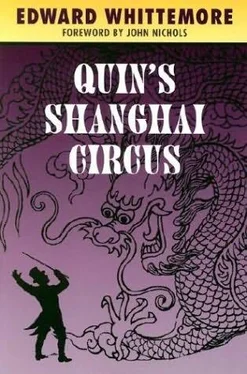Edward Whittemore - Quin’s Shanghai Circus
Здесь есть возможность читать онлайн «Edward Whittemore - Quin’s Shanghai Circus» весь текст электронной книги совершенно бесплатно (целиком полную версию без сокращений). В некоторых случаях можно слушать аудио, скачать через торрент в формате fb2 и присутствует краткое содержание. Жанр: Фэнтези, на английском языке. Описание произведения, (предисловие) а так же отзывы посетителей доступны на портале библиотеки ЛибКат.
- Название:Quin’s Shanghai Circus
- Автор:
- Жанр:
- Год:неизвестен
- ISBN:нет данных
- Рейтинг книги:3 / 5. Голосов: 1
-
Избранное:Добавить в избранное
- Отзывы:
-
Ваша оценка:
- 60
- 1
- 2
- 3
- 4
- 5
Quin’s Shanghai Circus: краткое содержание, описание и аннотация
Предлагаем к чтению аннотацию, описание, краткое содержание или предисловие (зависит от того, что написал сам автор книги «Quin’s Shanghai Circus»). Если вы не нашли необходимую информацию о книге — напишите в комментариях, мы постараемся отыскать её.
Quin’s Shanghai Circus — читать онлайн бесплатно полную книгу (весь текст) целиком
Ниже представлен текст книги, разбитый по страницам. Система сохранения места последней прочитанной страницы, позволяет с удобством читать онлайн бесплатно книгу «Quin’s Shanghai Circus», без необходимости каждый раз заново искать на чём Вы остановились. Поставьте закладку, и сможете в любой момент перейти на страницу, на которой закончили чтение.
Интервал:
Закладка:
Further evidence of the priest’s traitorous role turned up almost at once. Instead of leading a gay procession of young boys through the streets on Friday evenings, he was now seen in obscure quarters of the city late at night, hovering in doorways. Once he was reported to have been observed sneaking over a cemetery wall at midnight. Another time he was observed sneaking out the back gate of a cemetery at three o’clock in the morning. On both occasions, as the automobile of the observer drew near, he disappeared so quickly it was as if he had evaporated in the night.
Such clandestine behavior was readily explainable. The priest was meeting his contact from the Kempeitai.
Early in the 1930s the Western community in Tokyo succeeded in isolating Father Lamereaux. No one would speak to him. If he appeared on the street or at a public gathering, all backs turned on him. New residents were warned to have nothing to do with him. The tall, gaunt Jesuit who had once been known for his gentle wit, his perceptions, his prodigious memory, his articulate and sympathetic discourses on the subtleties of Japanese culture, became a totally solitary figure, shunned, abandoned, despised.
When Japan went to war with the West he was interned with other scholars and missionaries in a prison camp in the mountains. But even then his former services to the Kempeitai were not forgotten, for at a time when the other prisoners were finding it difficult to eat, Father Lamereaux was getting drunk day after day, alone as always, on genuine Irish whiskey captured by the Japanese army at the British officers’ mess in Singapore.
No one who talked to Quin had anything good to say for Father Lamereaux. Those who had known him hated him, everyone else reviled him.
I’m only sorry, said one man, that he wasn’t around to face a court after the war. Or at least to face us.
After the war? said Quin.
Yes, he died a few days after Japan surrendered, I’m not sure how. One story has it that he came back to Tokyo and finally succumbed to acute alcoholism. Another was that he returned to Kamakura and went insane, committed suicide by throwing himself under a collapsing wall during a typhoon.
In any case he’s gone. A lost curiosity and an ugly one.
Geraty’s history, by contrast, seemed to begin where the Jesuit’s had ended.
Little was known of his life before the war other than that he lived in Tokyo claiming to be the representative of a Canadian firm that manufactured quack leprosy drugs. He was a gloomy man who kept to himself, he was uncommunicative and seldom spoke to Westerners. On the rare occasions when anyone saw him he was always alone. He never tried to peddle his drugs and had no apparent source of income. In fact, he never seemed to do much of anything.
One suggestion was that he had been a criminal wanted in the United States. Another possibility was that he had been smuggling contraband from Mukden to Shanghai, for that was the route he took when he left Tokyo in the 1930s. He appeared to have remained in Shanghai until the coming of the war, when he escaped from China to the Philippines. Trapped there by the Japanese invasion, he went into hiding in the mountains.
As soon as the Japanese surrendered he presented himself to the American forces as a legendary guerrilla figure who had been fighting alone in the mountains for years, an elaborate tale he told with such conviction he was awarded a decoration for valor and recommended for a colonel’s commission in the army reserve.
While waiting for his commission to be approved, Geraty talked himself into a flight to Japan on the basis of his knowledge of the language and his long experience both there and in China. He arrived back in Tokyo during the first days of the Occupation and was given a sensitive position doing preliminary research in the archives of the Imperial Army, more specifically the captured Kempeitai files on China.
Geraty was in the job only a month or two when a mysterious fire burned down an entire wing of the warehouse where the Kempeitai files were stored. The American authorities were immediately suspicious because of the absence of paper ashes in the ruins. Furthermore, a blind Japanese beggar who had been sleeping in a gutter near the warehouse reported that he had been awakened by a convoy of passing trucks on the night of the fire.
A few telephone calls revealed that although a number of military trucks were out on various errands at the time of the fire, no one had authorized a convoy anywhere in the Tokyo area.
This information coincided with a report on Geraty’s pending commission. A routine investigation in the Philippines had showed that the giant American was remembered in many mountain villages, but only for his outrageous indolence. Hundreds of peasants were ready to testify that he had done nothing during the war but steal their homemade beer and sleep. It was true he had taught their children to sing Onward Christian Soldiers and had urged them to march off and fight the Japanese, but he himself had never left the safety of the remote mountaintop church where his hammock was strung in a dark corner behind the altar.
Geraty was called in and shown the report, which he read without comment. The beggar was brought in to repeat his testimony. Geraty’s observation then was that the blind man was starving and therefore probably subject to hallucinations. To prove his point he gave the ravenous beggar a turnip and asked him how it tasted. The shaking old man replied that it had the bouquet of green tea, the flavor of new rice, and the delicate consistency of the finest raw tuna. Geraty patted the old man on the head, offered to buy him a sackful of turnips, and turned back to his accusers grinning broadly.
He was fired on the spot and told he would never be able to work for the American government again, an announcement he accepted with a guffaw and a gesture so insulting he was thrown out the door.
Thereafter he supported himself by conducting lurid after-hour entertainments for American officers and their wives. While stationed in the bar of one of the better Tokyo hotels he would allude to what he called the frightening sexual habits of the everyday man in kimono. Most of the Americans in the Occupation knew nothing about Japan and Geraty obviously knew a great deal. In the course of an evening, besides having his drinks paid for, he generally managed to talk himself into at least one private showing.
Beginning at midnight, he would say, because that’s when these demons come alive. These vices sprang up during the era of warring states when the capital was in Kyoto, saints preserve us, before the devils moved their foul activities to Kamakura. You’ve seen Kyoto? Then you know the dark alleys I’m talking about, the hidden passageways and trapdoors, the monasteries tucked away up in the hills where even the most hideous screams would go unheard. The boating parties were always set for midnight, and long before dawn, you can be sure, the tortured victims were bound and gagged and weighted and flung into the water so there would be no evidence of the fiendish pleasures witnessed only by the moon. Read the old chronicles, it’s all there and has been for a thousand years. There’s an awesome legacy, I tell you, behind the blank face and ingratiating manners of the everyday man in kimono. But possibly for a certain sum, if we went about it in the right way, a man and his drinking companion or even a man and his wife might be able to catch a glimpse of these lost lustful aberrations, these age-old sinewy slithering depravities of the Eastern mind. Why come to the Orient and not see the truth? How can we overcome evil unless we see it in all its perverse variations?
Geraty would grow more florid as the evening wore on, his huge head hovering above the bar, his eyes bulging as he intoned the names of his favorite saints.
Читать дальшеИнтервал:
Закладка:
Похожие книги на «Quin’s Shanghai Circus»
Представляем Вашему вниманию похожие книги на «Quin’s Shanghai Circus» списком для выбора. Мы отобрали схожую по названию и смыслу литературу в надежде предоставить читателям больше вариантов отыскать новые, интересные, ещё непрочитанные произведения.
Обсуждение, отзывы о книге «Quin’s Shanghai Circus» и просто собственные мнения читателей. Оставьте ваши комментарии, напишите, что Вы думаете о произведении, его смысле или главных героях. Укажите что конкретно понравилось, а что нет, и почему Вы так считаете.












